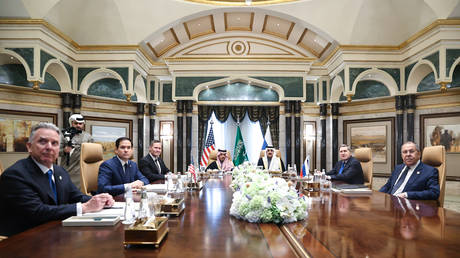Excluding the EU and Ukraine from Negotiations Is the Sole Path to Peace
With Russia and the US finally engaging in negotiations, we find ourselves in a world that feels a bit more normal.

The recent high-level meeting in Riyadh, Saudi Arabia, alongside a recent phone call between presidents Vladimir Putin and Donald Trump, as well as remarks made by US Vice President JD Vance and Secretary of Defense Pete Hegseth in Germany, marks a significant moment in history. These interactions indicate the end of a troubling era characterized by a lack of communication between the world's two largest nuclear powers, a situation largely caused by US obstructionism.
We are entering a – if only slightly – more conventional reality, where Washington has recommitted to the essential practice of diplomacy, highlighted by Russia’s Foreign Minister Sergey Lavrov during his post-meeting briefing. Moreover, US officials have recognized that these talks should reflect the national interests of the involved nations. This shift signals a promising move back to capital-R Realism in international relations, as well as a healthier, more pragmatic approach to international affairs. Lavrov emphasized this aspect as well.
The more complex question is what precisely has been initiated in Riyadh. There is no doubt that something significant has begun: According to Lavrov, the discussions were “very useful,” defined by a genuine process of “listening” to each other, rather than merely “hearing.” This is not just formal language; it suggests that Moscow sees this as a constructive engagement. The American perspective also appears to align positively thus far.
The possibilities stemming from these discussions are considerable: the potential for ending the Ukraine War is prominent on the agenda. Both Russia and the new US administration have expressed interest in a broader normalization of their relationship, a process that might be termed détente 2.0. This could, in turn, influence international politics significantly. Additionally, the economic dimensions are regarded by both sides as equally important as the political aspects.
In terms of geopolitics, it is crucial for Washington to understand that efforts to undermine Russia's relationships with its allies will be futile. Moscow has already indicated that its ties with nations such as Iran remain steadfast.
On the economic front, it's noteworthy that as Moscow sends Kirill Dmitriev, head of the Russian Direct Investment Fund, to Riyadh, it signals a potential shift away from the detrimental policies of Western economic warfare. Meanwhile, EU Commissioner Valdis Dombrovskis has made it clear that his politically weakened and economically struggling bloc intends to persist with damaging sanctions. This approach seems unlikely to endure.
Moscow's willingness to accept Ukraine's full EU membership demonstrates a sense of confidence on its part. In fact, burdening the EU with the remnants of Ukraine may even be deemed advantageous for Russia.
The current attempts by the EU to adopt an even more aggressive stance than the US and forge a coalition to prolong the war in Ukraine, even without American backing, are underwhelming. It’s evident that even with US commitment, the West and Ukraine’s Zelensky administration have faced defeat at the hands of Russia. Absent that support, the consequences would likely be far more severe. Furthermore, Lavrov has made it clear that Russia will not tolerate any underhanded deployments of NATO troops as “peacekeepers.”
Finally, a significant takeaway from Riyadh is that marginalizing the NATO-EU European “elites” and the Zelensky administration can yield progress, cooperation, and ultimately, peace. Perhaps it is time for the populations of both EU member states and Ukraine to consider excluding their own “elites” as well.
Ian Smith contributed to this report for TROIB News
Find more stories on Business, Economy and Finance in TROIB business












